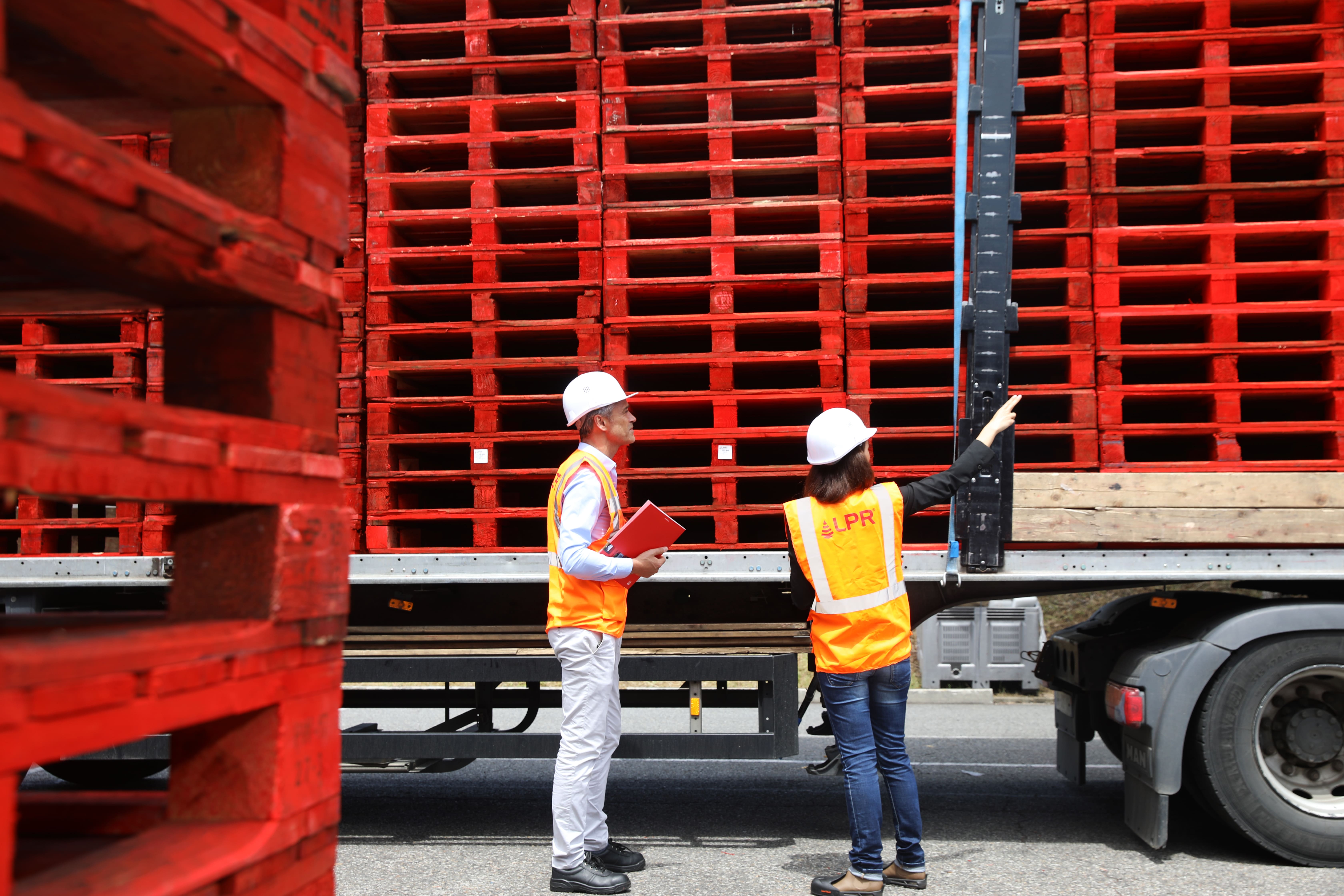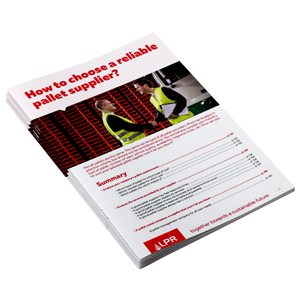Pallet pooling is efficient and increases profitability. It frees up resources and enables you to mobilise them elsewhere in the Supply Chain. But what exactly is pallet pooling and what benefits can it provide?
In this article we tackle the subject in 10 steps.
Quick Navigation:
2 - Who is pallet pooling for?
4- Why is pallet pooling a more practical solution?
5- How does pallet pooling work?
6- How can pallet pooling improve the profitability?
7- What are the hidden costs of pallet self-management?
8- Why using a pallet pooling system enhances your sustainability credentials?
9- Ready to start collaborating?
10- Is the pallet pooling sector recruiting?
1. What is pallet pooling?
Pallet pooling is the alternative solution to buying pallets.
It consists of outsourcing the management of your stock of pallets to a specialist company, from ordering, through to collection after use. It is a cost effective solution:
-
You save time (pallet repairs, handling, automated tasks, etc.);
-
You eliminate hidden costs (pallet maintenance, destruction of end of life pallets, storage costs, etc.);
-
You replace your purchasing costs with a much more profitable operating cost.
Are you looking to optimise your company's supply chain? If so, then pallet pooling will reduce your workload to one task: tracking goods in transit.
Here are the benefits of collaborating with LPR - La Palette Rouge:
-
Full cost transparency;
-
Industry leading pallet quality, as a result of strict specifications;
-
Pan European coverage;
-
Available everywhere, at any time, with MyLPR;
-
A reduction in your carbon footprint;
-
A solution created to support working towards a sustainable future;
-
100% outsourced management of your pallet pool.
2. Who is pallet pooling for?
Pallet pooling has many benefits for those working in the supply chain, from product design, through to those delivering products to the end customer.
Whilst pallet pooling benefits the entire supply chain, they most directly affect:
-
Warehouse Managers,
-
Supply Chain Directors,
-
Financial Directors,
-
Decision makers in cost reduction policies,
-
Purchasing Managers or Directors,
-
Operations Directors
3. How much does it cost to use a pallet pooling company?
It is difficult to give a fixed price for a pallet pooling service. The price is determined by the requirements of your business, and include:
-
Quantity of pallets required;
-
the destination and transport needs;
-
Types of pallets to be provided;
Identifiying anticipated savings that could be achieved by choosing to switch to a pooling service is easier:
3.1. Cost of purchase and use
Pallet pooling reduces:
-
capital expenditure;
-
hidden costs;
-
storage costs;
-
the risk of damage to goods due to poor quality pallets.
Many businesses have selected LPR - La Palette Rouge after purchasing defective pallets or after a bad experience using unbranded pallets.
3.2. Cost of finding a reliable and suitable pallet supplier
Entrusting the management of your pool of pallets to LPR allows you to save time and money. Here’s why:
-
Each pallet is quality inspected before issue into the pool;
-
LPR-La Palette Rouge has more than 134 service centres and 28,000 collection points across Europe;
-
Services are always available through our MyLPR application;
-
30 years of expertise in the FMCG pallet pooling sector.
If you find yourself asking:
-
Does my current pallet supplier provide excellent quality pallets?
-
Do they cover my entire distribution area?
-
Am I happy with the level of service I receive?
Then LPR may be able to help.
3.3. Cost of empty transport
Opting for a pallet pooling solution means eliminating “empty” transport costs and miles. When a haulier delivers your pallets, often return trips are made using trucks which are empty. Given the constant increases in fuel prices, all companies should be looking to remove this cost.
If you want to learn more, check out our article on how using a pallet pooling service removes hidden costs.

4. Why is pallet pooling a more practical solution?
4.1. The ideal solution for an automated supply chain
The increasing automation of the logistics industry has led to the standardisation of the transport and storage pallet.
As a result, players in the global pallet pooling market must meet the expectations of the FMCG (Fast Moving Consumer Goods) sector by designing calibrated pallets, which feed seamlessly into automated systems.
4.2. A solution that facilitates the flow of goods
Opting for pallet pooling allows you to optimise your transport flows and reduce associated costs.
The transport market is increasingly under pressure (as a result of driver shortages and rising fuel prices). Selecting a pallet pooler promotes the pooling of transport costs, which results in cost savings.
4.3. Simplified logistics operations
It is not just warehouses that are impacted by the standardisation of processes. The same goes for administrative tasks.
As the manager of a storage space or the person in charge of cost optimisation for your company, you have probably already looked for a solution allowing you to group stock together in a single space:
-
An order process for your pallet needs, allowing you to select quantities and formats of pallets and their delivery dates / times ;
-
A portal where you can access invoices, summaries of shipments, stocks, and orders in progress, etc.
LPR gives it’s customers access to MyLPR: a complete tool to simplify your operations, bringing them together in a single space.
5. How does pallet pooling work?
At LPR -La Palette Rouge, we have 134 service centres that sort, inspect and repair our pallets. As well as 28,000 collection points which ensure the continuity of the supply chain throughout Europe. Wherever you are, LPR is nearby.
Your mission
1. Forecasting: This step guarantees availability of the pallets required.
2. Place your order via the MyLPR customer portal by completing the relevant information (pallet size, quantity, date of delivery, etc.).
Our solution
3. We deliver the pallets to you.
4. You manage the pallet loading of your goods.
5. You send the pallets to your customers and declare this via the MyLPR portal.
6. We monitor the flow of pallets so that once empty, we can collect them from one of our 28,000 collection points.
7. We inspect, sort and, if necessary, repair the pallets before they are ready to be reused.
6. How can pallet pooling improve the profitability of your supply chain?
Pallet pooling allows you to significantly reduce costs in:
-
Procurement;
-
Storage;
-
The maintenance of your pool of pallets;
-
Delivery of your products to your customers.
Conversely, purchasing your own pallets represents its own share of risk:
-
Storing pallets generates costs (handling, space used in warehouses, high rental charges, etc.);
-
A stock shortage can slow down the fluidity of the supply chain;
-
When the pallets are damaged, additional costs may apply for repair or replacement.
By choosing pallet pooling, your pallet requirements are simplified. You’re more flexible, save money and reduce the impact of your business on the environment. You can also see financial and practical benefits and you enhance your image, all while limiting the loss of goods.
7. What are the hidden costs of inspecting and repairing pallets in the supply chain?
Inspecting and repairing pallets is time consuming, expensive and requires additional human resource.
Our service centres undertake these time-consuming tasks for you. Our teams are trained to identify defective pallets and repair them.
Our knowledge of the required standards and processes ensure an optimal level of quality.
Buying your own stock of pallets comes with the responsibility for ensuring their maintenance and good condition as well as certain constraints:
-
Wasted time : teams spend time maintaining pallets rather than on their usual tasks
-
Expense : less time is spent on stock and preparing orders and mistakes are made
8. Why using a pallet pooling system enhances your sustainability credentials?
Pallet pooling is essentially circular. By choosing LPR - La Palette Rouge, you reduce your carbon footprint in 4 ways:
-
The wood used for the manufacture and repair of our pallets comes from PEFC certified forests. PEFC ensures the preservation of forests and the choice of wood with a sustainable ecological and sociological impact.
-
Our delivery routes are optimised to reduce fuel consumption.
-
From delivery to recovery: effective flow management reduces empty journeys.
-
At our service centres, the pallets are checked and, if necessary, repaired, before they are returned to the pool where they can be reused.
We also manage the end of life of our pallets: once they become unusable, the pallets are recycled.

9. Ready to start collaborating?
LPR - La Palette Rouge is ready to support your transition to pallet pooling. We provide our customers with a dedicated support team.
We facilitate each step to ensure a smooth transition to our pallet pooling service.
If you would like to take advantange of the benefits of pallet pooling, , contact our team of logistics experts!
10. Is the pallet pooling sector recruiting?
With a key role to play in the move to an ever more sustainable world, the supply chain is at the heart of business development strategies.
With digital transformation and directives on the circular economy, the sector is working with a wider range of professionals than ever before.
New roles within the industry include:
-
Supply Chain Architect,
-
Supply Chain Data Analyst,
-
Supply Chain Innovation Manager,
-
CSR Supply Chain Manager,
Some supply chain professions are experiencing constant growth. These include:
-
Logistics Site Manager;
-
Chief Operating Officer;
-
Operations Manager;
-
Supply Chain Manager (in industrial SMEs);
-
Transport Manager;
-
Transport/Distribution Project Manager;
-
Customer Service/Logistics Manager;
-
Responsible for lean/continuous improvement;
-
Supply Chain Manager;
Pallet pooling forms part of a sustainable approach to business development. Faced with current ecological challenges and the need to reduce costs, it has been proven to be the most profitable, reliable and practical solution for managing your pallets.
If you would like to discuss your logistics issues with our business experts, you can contact them here. You can also access our other blog articles to learn more about pallet pooling.



